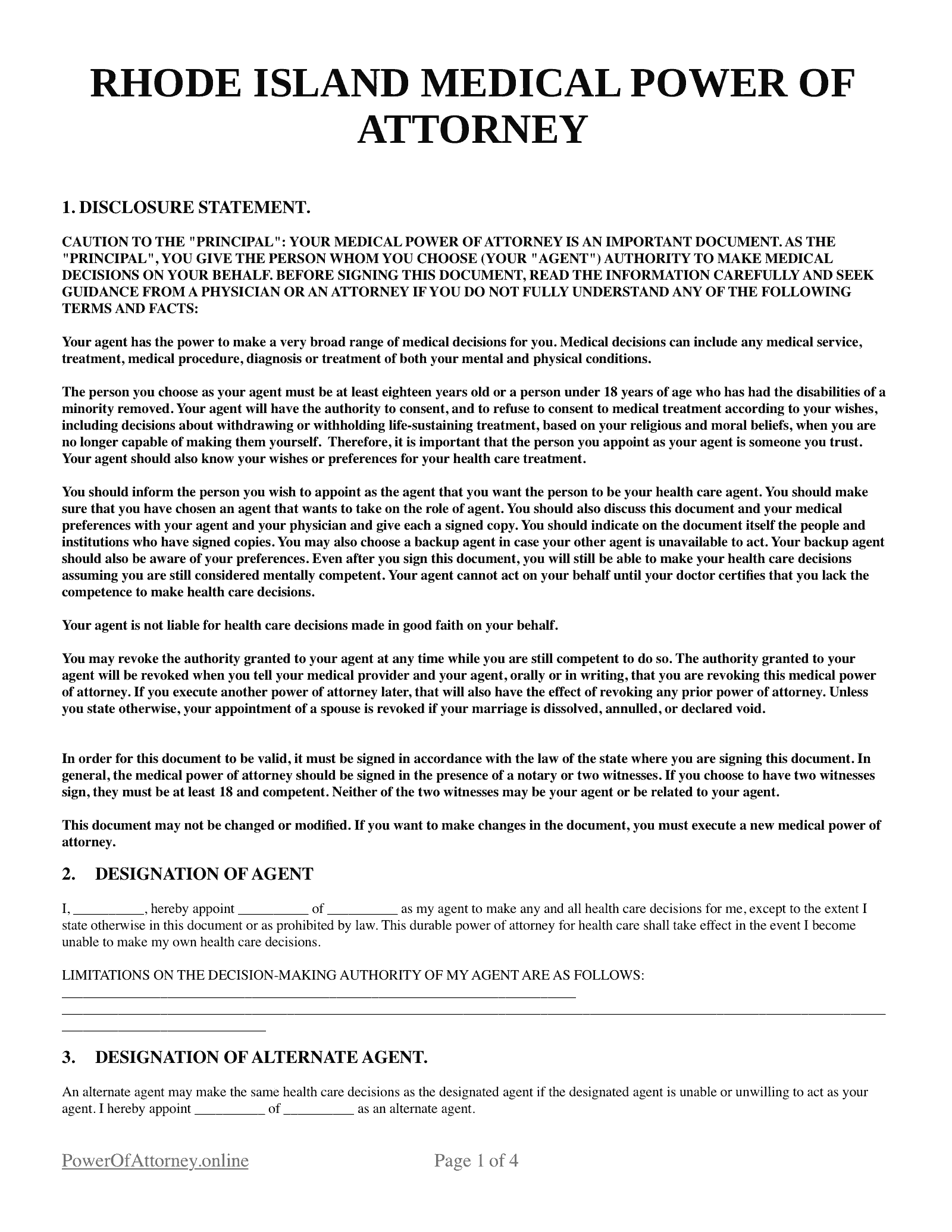Free Rhode Island Medical Power of Attorney Forms
A medical power of attorney, also known as a medical POA, is a document that grants permission to an individual (the agent) to make decisions regarding health matters on behalf of another (the principal)

Rhode Island Medical Power of Attorney Laws
Under Rhode Island state laws, a medical POA grants an agent the “authority to consent, to refuse to consent, or to withdraw consent to any care, treatment, service, or procedure to maintain, diagnose, or treat a physical or mental condition” (R.I. Gen. Laws § 23-4.10-2).
Signing Requirements in Rhode Island
A medical POA in Rhode Island must be witnessed by a notary public or two qualified adult witnesses. None of the following may be used as one of the qualified adult witnesses:
- A person you designate as your agent or alternate agent,
- A healthcare provider,
- An employee of a health care provider,
- The operator of a community care facility,
- An employee of an operator of a community care facility.
Make sure you find two witnesses who are fit to do so (R.I. Gen. Laws § 23-4.10-2(9)).
How To Write a Medical POA in Rhode Island
Writing a healthcare POA form in Rhode Island is relatively straightforward. You may choose to download a printable medical POA template or write your own. Regardless, make sure your medical POA follows these steps.
1. Identify the role
First, you will need to decide who the person is that will be the agent for the principal. This must be someone the principal can trust to carry out their wishes in the event that they are incapacitated or deemed mentally incompetent.
Remember, this person acts on behalf of the principal, so must be ready and willing to do so.
2. Add personal information
For both the agent and the principal, their full legal name and address must be provided. For the agent, contact information must also be clearly stated.
3. Declaration
The POA must include a declaration that the principal is of sound mind and legal age. This is to assure courts that the POA wasn’t created under duress and that the principal has voluntarily and with full understanding appointed the individual as the agent.
4. Set out instructions and preferences
In this part, the principal must set out what instructions they would like the agent to follow regarding medical treatments, end-of-life care, and other healthcare decisions relating to their specific situation.
This section should also cover your preferences on things like life-sustaining treatments, organ donation, and palliative care.
5. Set the duration and revocation terms
This section should cover what conditions need to be met for the power of attorney to take effect and when the POA remains in place. A medical POA may remain in place until the principal’s death, but it can also be revoked under specific conditions, such as recovery.
You will also need to define the process for revocation, should recovery occur and be likely.
6. Alternate agents
As a precaution, alternate agents should be set out in your medical POA. In some cases, the person assigned to the agent may not be able to follow through with their role due to unforeseen circumstances. Include the names, addresses, and contact numbers of at least two alternate agents.
7. Principal signature
The principal must sign and date the medical POA to make it legally binding.
8. Witnesses
In the state of Rhode Island, the document must be signed in the presence of two adult witnesses or a notary. Ensure you meet this criteria because not doing so may mean your medical POA is not legally binding.
9. Include the effective date
Your medical POA must also include a date on which the document will become effective.